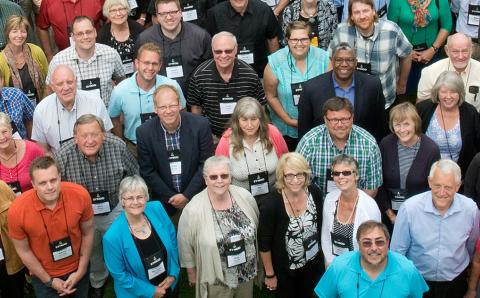After a long and sometimes electric debate, Synod 2016, the general assembly of the Christian Reformed Church, proposed that the Belhar Confession be categorized as a contemporary testimony, giving it a higher status within the CRC. It would give it the same status as “Our World Belongs to God.”
The Belhar is a confession born in South Africa out of the struggle against apartheid. It affirms centrally that the church is a single reconciled and reconciling community in Christ, and that anything, including apartheid or other forms of racism, that would introduce unbiblical divisions into the body of Christ is wrong and should be condemned. The South African churches that created the Belhar Confession offered it to the worldwide Reformed community as a new confession, drawing a line between what is acceptable among Reformed people and what is not.
Lenore Maine set the stage for the discussion early. She said the Belhar is needed for our collective witness. She said that even if others don’t think they need it, “We in New Jersey need it.” She spoke of her anger at the long legacy of systemic racism, of being denied participation in the American dream. She told a story of being a young black girl bused 21 miles to school. One day she was detained by a police officer for jaywalking. By the time she was released, the bus had left. She started to walk the 21 miles home until someone picked her up. These and other racially motivated actions have scarred her.
Tracie Traylor-Rhodes, also of Hackensack, picked up the theme. “I echo my sister’s pain,” she said. “I must say that my life has not always been easy either.” She spoke of her fears for her son. “Where is justice in America?” she asked.
The Christian Reformed Church has struggled to know what to do with the Belhar. Synod 2012 decided not to make the Belhar a fourth confession alongside three Reformation confessions: the Heidelberg Catechism, the Belgic Confession, and the Canons of Dort. Instead, synod created a new category of faith affirmation, which they called an “Ecumenical Faith Declaration,” a category not clearly defined nor recognized by the ecumenical partners in the wider Reformed community.
Classis Hackensack, a regional group of churches, asked Synod 2016 to reconsider the 2012 decision and to give the Belhar the status of a confession alongside the Heidelberg Catechism, the Belgic Confession, and the Canons of Dort.
The synodical discussion was long, often intense, and filled with the desire to reach a stronger consensus on the role of the Belhar confession in promoting reconciliation and opposing racism.
Synod prayed a prayer of lament about racism and violence in our societies. “O God of the cross and the lynching tree,” the prayer began. “Gunshots ring out under the heavens that declare your glory.” The prayer went on: “The streets and the sidewalks of your dwelling place flow with blood.” To a repeated chorus of, “How long, O God?” the prayer lamented turning mothers and grandmothers into mourners.
Bruce Gritter, Classis Atlantic Northeast, argued that the Belhar had been “consigned to confessional purgatory.” Jei Wilson, Classis Chicago South, said that assigning the Belhar to separate category with no prior history hinted at “separate but equal.”
Lisa Vander Wal, the fraternal delegate from the Reformed Church in America, said that the Ecumenical Faith Declaration category, like “an airplane on a road,” didn’t seem to fit. The Reformed Church in America has adopted the Belhar as a full confession.
John Meiboom, Classis Toronto, gave another reason why the Ecumenical Faith Declaration category seemed to him to be less than adequate. He said it pointed outward and not to the CRC itself: “I’m hearing today in more clear terms why we need this [moving the Belhar to the category of a contemporary testimony]. We need it for ourselves.” Bert Slofstra, British Columbia South-East, spoke of the need for the Belhar to have relevance to the local church. Situated as it is now, he said, “The Belhar says absolutely nothing to the life of the church.”
Some delegates doubted that changing categories would make any difference for the use of the Belhar confession in the churches, but others strongly suggested it would. Chelsea Harmon, British Columbia Northwest, said, “We as a synod . . . said that we denounce systemic racism, and this is a way we take action.” To those who opposed recategorizing the Belhar, Jei Wilson said, “I don’t understand why if it won’t make a difference, we are fighting against it.”
Changing the status of the Belhar does make a difference in the Covenant of Officebearers that all officebearers must sign. This covenant now requires officebearers to affirm the contemporary testimony called Our World Belongs to God “as a current Reformed expression of the Christian faith that forms and guides [them] in [their] present context.” If the Belhar is moved to the category of a contemporary testimony, it would require officebearers to affirm the same thing of the Belhar.
Bert Slofstra said that “if we give the Belhar the same status as the contemporary testimony [“Our World Belongs to God”], then every year our officebearers are confronted with the contents of the Belhar.
Some delegates worried whether elevating the Belhar to the status of a contemporary testimony and including it in the Covenant for Officebearers would require them to sign a document with which they could not fully agree, but they were advised that in agreeing to non-confessional statements the CRC already allows officebearers some latitude.
The proposal to recategorize the Belhar Confession is now referred to Synod 2017, which will make the final decision in the matter.
Synod 2016 is meeting at Calvin College in Grand Rapids, Mich., from June 10-17. For continuous Banner coverage, please follow The Banner Magazine on Facebook or @crcbanner on Twitter. You can find more tweeting by following hashtag #crcsynod. News stories will be posted at thebanner.org several times daily. For CRC Communications releases, webcast, and live blogging, please visit crcna.org/synod. Unless noted otherwise, all photographs are by Karen Huttenga.
About the Author
Clayton Libolt was the long time pastor of River Terrace Church in East Lansing, Mich. Since his retirement, he has served in a variety of interim positions. He is presently serving as the interim senior pastor of Sonlight Community CRC in Lynden, Wash.









